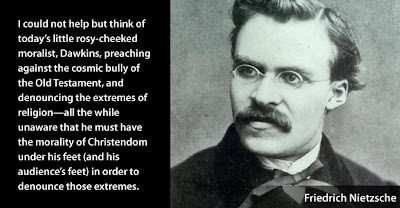by Joel McDurmon
I long since stopped blogging on atheism, deeming it often a waste of time and occasionally counterproductive. Sometimes, however, the issue merits revisiting. After rereading some old classics, I find the following quotation worth sharing:
When one gives up the Christian faith, one pulls the right to Christian morality out from under one’s feet. This morality is by no means self-evident: this point has to be exhibited again and again, despite the English flatheads. Christianity is a system, a whole view of things thought out together. By breaking one main concept out of it, the faith in God, one breaks the whole: nothing necessary remains in one’s hands. Christianity presupposes that man does not know, cannot know, what is good for him, what evil: he believes in God, who alone knows it. Christian morality is a command; its origin is transcendent; it is beyond all criticism, all right to criticism; it has truth only if God has truth—it stands or falls with faith in God.
In this quotation, many of my readers will immediately detect the echo of Van Til, or Bahnsen, or some other related apologist infused with “worldview,” or presuppositional thinking. Such a guess comes close in content, but misses widely. The surprise: this quotation flows candidly—and insightfully!—from arch-atheist Friedrich Nietzsche.[1] This is not, of course, to say that Van Til derived his ideas from reading Nietzsche—highly unlikely. The point—completely lost on modern atheists—is that when you strike down Christianity, Christian morality necessarily goes with it. Nietzsche candidly professed this, as did his earlier French counterpart Marquis de Sade: no God, no moral imperatives; no “thou shalt,” and no “thou shalt not.” Only, “I will.” Read more
